| More about: | Ahmed Yassin, United States, Arab citizens of Israel, New York |
Where the heart is
An Israeli Arab family combines traditional Arab craftsmanship with modern sophistication.


| More about: | Ahmed Yassin, United States, Arab citizens of Israel, New York |